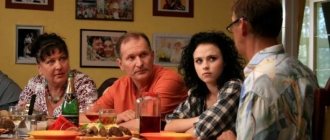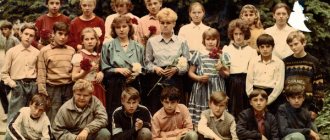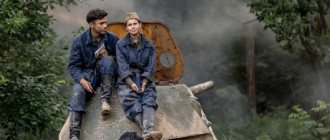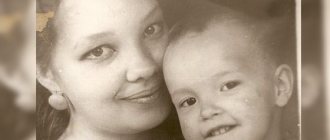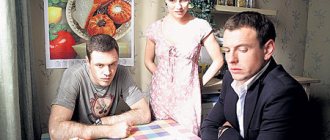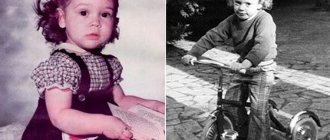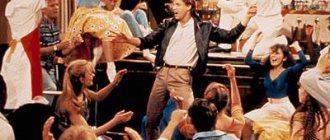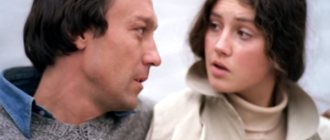The most popular domestic serial films of the 1970-1980s are “Gypsy” and “The Return of Budulai.” Actor M. Volontir was little known outside of Moldova until 1979, and after that he became a real star. The main female role was played by K. Luchko.
What is the Soviet series about? Who played, besides Volontir and Luchko, in “The Return of Budulai”? Actors, film crew, interesting facts from the history of the creation of the film - all this is described in the article.
Literary source
Anatoly Kalinin is a writer whose name few know today. In Soviet times, the magazine “Roman-Gazeta” was published. In one of the issues of this publication in the early seventies, the story “Gypsy” appeared. This is Kalinin's most famous work.
The writer was from the Rostov region and loved his region very much. In one of the Don farms, he settled the heroes of the work, which formed the basis for the films “Gypsy” and “The Return of Budulai.”
The actors who played the main roles in the Soviet melodrama are no longer alive. Before we talk about them in more detail, let’s provide information about the film, which was released in the late seventies.
Career of Matlyuba Alimova
After a successful debut, the girl was chosen to play the role of the gypsy Nastya. Thus, by starring in the TV series “Gypsy,” Matlyuba gained worldwide fame and became famous. Oddly enough, not only television viewers, but also real gypsies immediately believed in the actress’s gypsy roots, as the artist herself said.
Afterwards, already in 1985, the famous actress again played the role of the proud gypsy Nastya in the continuation of the series, called “The Return of Budulai.” This film remained a favorite among viewers for many years, and their love was reliably won by Matlyuba Alimova, who so wonderfully performed the touching role.
In the coming years, the actress managed to star in various films, but since the 1990s, Matlyuba Alimova appears in films extremely rarely. For some time, the famous actress could not accept that the current filming regime was already a thing of the past. However, supported by her faith in God, Matlyuba Alimova decided to start restoring the embroidery of oriental carpets. And later the actress appeared on the screen again, starring in the film “Taras Bulba”, where she played the role of the maid Elzbieta.
It is always very interesting to touch the history of the hero of a film that was released on the big screen decades ago. Therefore, we invite you to remember the heroes of Eldar Ryazanov’s legendary film “Office Romance” and find out what the film’s actors look like now and how their destinies turned out 40 years later.
Casting for the film “Gypsy” (1979)
Only Luchko could play the main female role in this film. Alexander Blank, director of “The Return of Budulai” and “Gypsy,” did not even consider other candidates. Firstly, Luchko was one of the most famous and talented Soviet actresses. Secondly, in the late forties she became famous for her role in Pyryev’s film “Kuban Cossacks”, and although she was from Ukraine, she was perceived by the audience as a true Cossack.
So, preparing for the filming of the film “Gypsy,” Blank wanted to see only Clara Luchko in the role of the main character. Kalinin also believed that only this actress could authentically play a Don Cossack woman, a strong woman who raised someone else’s child as her own. The fact that Luchko was over fifty by that time, and the heroine of the film was about forty, did not bother either the director or the scriptwriter. However, the actress looked younger than her age.
The situation was more difficult with the search for an artist who could play Budulai. Many actors auditioned for the role of the gypsy, but the director did not like any of the candidates. And here Klara Stepanovna helped. It was she who proposed the candidacy of the Moldovan artist.
Budulai could be played by Armen Dzhigarkhanyan. But he couldn't come to the audition. A very talented actor from Armenia also auditioned. However, Luchko told the director about him this way: “I won’t be able to love him.” And then I remembered Mihai Volontir, whom I first met in 1977 during the filming of the film “The Root of Life.”
The Moldovan actor did not immediately agree. The entire repertoire of the theater in Balti was based on it. However, after reading the script, he could not refuse. The actor came to audition in the Rostov region, and his performance delighted the director. True, I had to improve my Russian language - Mihai Volontir spoke with a strong accent, but did not want to be dubbed.
Screen adaptations and dramatizations[ | ]
Anatoly Kalinin's novel was destined to become very popular, especially after a number of film adaptations. Soviet viewers, and especially female spectators, fell in love with the courageous and noble Budulai[5]. The first film adaptation of the novel “Gypsy” was a film by Soviet film director Evgeny Matveev. As Fyodor Razzakov, a researcher of Russian film history, notes, Matveev began filming a film based on the novel in 1966, and worked on it not only as a director, but also as an actor. He took the main role - Budulaya, and invited Lyudmila Khityaeva to play the main female role of Claudia. The film premiered on July 13, 1967 in Moscow to a huge crowd. According to the results of a survey conducted by the magazine "Soviet Screen", the acting works of Matveev and Khityaeva were named among the best for 1967. However, this film also had its detractors. According to Razzakov himself, as an artist
, Matveev miraculously restored the provincial melodrama of ancient times on the screen[12].
The second film adaptation was released in 1979. By the way, the filming of this film was postponed for a long time due to the fact that its creators could not find a suitable actor for the role of Budulai. Nikolai Slichenko and Armen Dzhigarkhanyan tried out, but even they did not correspond to the director’s vision of the image. And then the performer of the main female role, actress Klara Luchko, whose candidacy was personally insisted on by Anatoly Kalinin [Note. 3], showed director Alexander Blank a photo of Mihai Volontir, with whom she had previously worked together. The roles played by the main character and the main character, recalls Luchko, grew not just into friendship, which can be between a man and a woman, but almost into a family relationship. This relationship continued until the death of Klara Luchko in 2005[13].
| External images | |
| Mihai Volontir at the anvil | |
| RIA News" | |
In the film, Budulai spends a lot of time in the village blacksmith shop. In a conversation with a correspondent for Theater magazine, Mihai Volontir said that although he grew up in the village, before working on this film he had never had the opportunity to stand at the forge. And the scene in the forge was very important for revealing Budulai’s character. On the Don, in the village of Pukhlyakovskaya, where the filming took place, Volontir was introduced to a blacksmith - Uncle Kostya. It was from him that Volontir had to learn blacksmithing in a very short time. Mikhai Ermolaevich got on his motorcycle at four o'clock in the morning and rushed to his mentor. This same Uncle Kostya, according to Volontir, helped him reveal new facets of his hero’s character. To thank this man, he forged him a small horseshoe with his film autograph - “Budulay”[14].
The second film adaptation surpassed the first in its success. Almost the entire village where the film was filmed gathered every day to see “what’s going on with Klavka and Budulai today.”[15] The performer of the role of Budulai, actor Mihai Volontir, was called “the main gypsy of Russia.” Letters addressed to Mihai Volontir were marked with the phrase: “Cinema. I will”[16]. According to Valery Chumakov, a columnist for the Ogonyok magazine, the role of the free gypsy Budulai became the pinnacle of Mikhai Volontir’s acting career[17].
Initially, according to the script, Budulai died at the end of the film, but Mihai Volontir foresaw the future success of the film, and therefore asked the director “not to kill” his hero. The author of the novel, Anatoly Kalinin, unexpectedly agreed with him. Through the efforts of Mikhai Ermolaevich, appropriate changes were made to the script and the ending became open: the wounded Budulai is taken away and the viewer does not know whether he survived or not[16]. Thanks to this, in 1985 it became possible to release a sequel, “The Return of Budulai” with the same actors, which did not gain much popularity.
In the mid-1990s, the four-part film “The Unexpected Budulai” was released with Otar Megvinetukhutsesi in the title role, which presented a “dark” version of Budulai’s biography that was characteristic of that time. The director turned the front-line hero into a convict who returned after 10 years in prison.
Opera "Gypsy". The role of Budulai is performed by Honored Artist of Russia Pyotr Makarov. In one of his interviews, Makarov admitted that Budulai’s party is one of his favorite[18]
Rostov composer Leonid Klinichev wrote a romantic opera of the same name in two acts and four scenes based on the novel by Anatoly Kalinin. The action of the opera is transferred to the present day, which the creator of the novel resisted for a long time. Budulai appears as an Afghan veteran. The image of Budulai in the opera is the image of a lonely wanderer, a wanderer who, as noted by the candidate of art history, associate professor of the Rostov State Conservatory (Academy) named after. S. V. Rachmaninov Natalya Meshcheryakova - seems to separate him from other characters, and the aura of a truth-seeker, a seeker of truth, “raises” him above his surroundings. He is something akin to an oratorio hero, and at the same time, he contains echoes of the typical romantic image of the Old Gypsy from Sergei Rachmaninov’s opera “Aleko” - he is free from the tragic collision “One against all”, characteristic of other romantic characters. Instead, he is a national hero who becomes the embodiment of romantic duty, and his ethos is elevated to the level of ancient tragedies. Klinichev took a long time to create this opera, work on which began for him back in 1974, and lasted more than thirty years[19]. Composer Leonid Klinichev met Anatoly Kalinin in the mid-80s. Then Klinichev, who had just completed the ballet Quiet Don, brought excerpts of it to Kalinin, who liked what he heard and agreed to create a musical work based on his novel. It cannot be said that their partnership in this field was smooth. Klinichev had three versions of the opera “Gypsy”: chamber, large and final, finalized already in 2002. While writing the opera, the composer often traveled to Kalinin. “There were moments when Kalinin wanted a literary text, but opera has its own laws. We had to change the word to the detriment of literature,” Klinichev later admitted. Some scenes had to be rewritten twenty times, and then abandoned altogether[20]. The opera premiered in the spring of 2005. Writer Anatoly Kalinin described the opera this way: “The opera “Gypsy” is no longer my novel. This is Klinichev’s musical novel.” Based on “Gypsy,” Klinichev also wrote a large orchestral suite for the Italian orchestra[21].
In an earlier theatrical performance "Gypsy", staged on the Rostov theater stage, the role of Budulai was played by People's Artist of Russia, laureate of the State Prize of the RSFSR. Stanislavsky Nikolai Provotorov[22] and People's Artist of the USSR Mikhail Bushnov.
The plot of the film "Gypsy"
The main character, Klavdia Pukhlyakova, during the war sees a gypsy tent crushed by a German tank. She manages to save the child. His mother died in that tent, and his father at the front. Claudia raises the boy as her son. She has an older daughter. My husband died in the war.
Years pass. Son Ivan considers Claudia his own mother. But one day an elderly gypsy appears in the village, and the woman realizes that he is the boy’s real father. Vanya becomes close to Budulai. Claudia fears that the appearance of a gypsy will bring discord to her family. But soon she herself will fall in love with Budulai.
According to the plot of Kalinin's work, the main character dies. However, during the filming of the film “Gypsy,” Mihai Volontir began to persuade the director not to “kill” Budulai. And the screenwriter felt sorry for his hero.
In the last episode of “Gypsy,” bandits brutally beat Budulai. What will happen to him next is unknown. But after the heroes of the four-part film gained all-Union fame, it became clear that a sequel should be made. “The Return of Budulai” was released in 1985.
"Gypsy"
It’s worth saying a few words about this film before outlining the plot of the film “The Return of Budulai.” The actors who played in the first part also took part in the filming of the sequel.
At the center of the story is the story of the Don Cossack woman Claudia. The main character of the films “Gypsy” and “The Return of Budulai” has two children. The actors who played the roles of Claudia’s daughter and son are Alexey Nikulnikov and Olga Zhulina. But, as it turns out later, she is only a daughter. The boy Claudius was once saved from certain death. He miraculously survived. The woman found him not far from a gypsy tent crushed by a German tank. Claudia raised the boy as her own. Ivan – that’s the young man’s name – and has no idea that gypsy blood flows in his veins.
But Budulai, Ivan’s father, suddenly comes to the village. And Claudia begins to fear that the presence of this man will disturb the peace in her house.
Contents of the second part
“The Return of Budulai” tells the story of an elderly man looking for his relatives. After being attacked by bandits, he miraculously remains alive. But his memory leaves him. Budulai spends several months in the hospital, and then, out of old habit, wanders around the world, more precisely in the Rostov region, trying to remember who he is.
One day he meets his son Ivan. And only then does the memory return to him. In the final scene, Claudia runs to meet Budulai and Ivan, who are returning home. This is the plot of “The Return of Budulai”.
Klara Stepanovna Luchko
She played her feelings on screen so sincerely that the audience believed: the actress loves Volontir in real life. But this, of course, is not true. Klara Stepanovna was married and would never have allowed herself an affair. And her partner in the film “The Return of Budulai” lived in marriage for more than fifty years with actress Efrosinya Dobynde and loved her very much. Nevertheless, he had a long-term friendship with Clara.
The future actress was born in 1925 in the Poltava region. Her parents held leadership positions in the village, but Klara herself did not dream of a career on a collective farm. She wanted to become an actress. In 1943, Luchko entered VGIK. And five years later she made her film debut.
Clara Luchko became famous in 1949, after the release of the film “Kuban Cossacks”. At the same time, it was after the filming of this picture that difficulties began in the life of the young actress. Director Pyryev showed mixed interest in Clara. But she liked her partner Sergei Lukyanov, whom she later married. There was a scandal right on the set - the actor hit the director. Luchko ended up on Pyryev’s secret blacklist and did not act on Mosfilm for many years.
The actress has more than 50 film roles and 15 awards. But for many, she remains Claudia from the films “Gypsy” and “The Return of Budulai.” The People's Artist passed away on March 26, 2005. Her death was sudden: a blood clot broke loose. Klara Luchko was buried at the Novodevichy cemetery.
Mikhai Ermolaevich Volontir
The future actor was born in 1934 in that part of Moldova, which in the mid-thirties was still part of the Kingdom of Romania. His father was a forester. In 1955, Mihai Volontir graduated from a pedagogical school, but began teaching at school at the age of 18. In 1957, without any acting training, he was accepted into the troupe of the drama theater in Balti.
Volontir first appeared in films in 1967. His filmography includes more than 30 roles. When it became known in the 2000s that the famous actor was seriously ill, the Moscow government, Russian actors and ordinary viewers living in different parts of the former Soviet Union came to the rescue. Money was raised for Volontir's treatment. The actor underwent several operations in a St. Petersburg clinic.
He refused to communicate with journalists during the period of treatment. “I’m an actor and I can’t appear to the audience like this,” said Mihai Volontir when he gave his last interview. Then, in 2014, it seemed that the artist managed to overcome the disease. But he died a year later - on September 15, 2015.
Actor Mihai Volontir, who played Budulai, has passed away
SUKHUM, September 15 – Sputnik. The modern acting school has lost a lot with the departure of Mihai Volontir, Svetlana Bivol, director of the National Philharmonic of Moldova named after Sergei Lunkevich, told a Sputnik Moldova correspondent.
The famous actor Mihai Volontir died on the night of Monday to Tuesday at the age of 82. The artist’s widow Efrosinya Dobynde-Volontir reported this to Sputnik. She called the cause of her husband’s death “a long illness.” The volunteer died in Chisinau at the Republican Clinical Hospital (RCH).
For the last 2.5 months, Volontir has been under constant inpatient treatment, first in the city hospital of his hometown Balti, and then in the Republican Clinical Hospital. According to doctors, the actor’s previous illnesses have worsened, largely due to his advanced age. Before this, Volontir had not been examined for three years.
“This is very sad news. Mihai Volontir is a lump in cinematography. He is a symbol of the national acting school and Soviet cinematography, the most touching, kind and bright man I have ever seen. He was an amazing person, very decent, open, filled with light. By creating a theater in Balti, he erected a monument to himself during his lifetime,” Bivol said.
According to the interlocutor, Volontir has an amazing family - a daughter, granddaughter and an amazing wife, who was always there and was a reliable support.
“Although she is also a wonderful actress, but for the sake of her husband she always tried to be a little in the background. A great man needs just such a companion. I knew him personally and his family. This decency, elite upbringing, modesty have always distinguished him from everyone else. I often saw him backstage when he came out in a hat to perform his famous song “Viata asta-i scurta tare” (This life is too short). Behind the scenes, he always stood modestly, prepared, tuned in to this image and came out very elegantly. His appearance on stage always evoked a lot of emotions,” Bivol emphasized.
Biography of Mihai Volontir
Mihai Volontir was born in 1934 in the village of Glinzheni, Soldanesti region. Graduated from the Pedagogical College in Orhei. Since 1957 he has served at the Musical Drama Theater (now the National Theater) named after Aleksandri in Balti. He played more than 120 main roles on his stage.
He made his film debut in the film adaptation of the comedy “Kiritsa in Iasi” based on the work of Vasile Alexandri in 1967. He is best known for the films “In the Zone of Special Attention”, “Return Move”, “Dmitry Cantemir”, and the television series “Gypsy” and “Return of Budulai”.
People's Artist of the MSSR, People's Artist of the USSR, laureate of the State Prize of the MSSR, State Prize of the RSFSR named after the Vasiliev brothers, holder of the Order of the Republic (Moldova), and other significant awards and prizes. Named the best actor of the twentieth century in Moldovan cinema (according to the Academy of Sciences of Moldova).
Member of the Union of Cinematographers of the USSR. Deputy of the Supreme Council of the MSSR of the XII convocation.
Alexey Nikulnikov
The actor was approved for the role of the main character's son due to his external resemblance to Mihai Volontir. Then Alexey Nikulnikov was barely 18 years old, he was a student at the Rostov School of Arts. Later, in an interview, the actor said that he managed to play the role of Ivan thanks to Klara Luchko, who treated him like her own son not only on the screen, but also in life. Until her death, he maintained a warm relationship with her.
Klara Luchko persuaded him to enter VGIK. However, Alexey did not become a student at the Cinematography Institute. He graduated from the Rostov School and starred in 15 more films. Today he writes poetry, music, and gives concerts.
Nina Ruslanova
The People's Artist has a small but very bright role in films about the adventures of the gypsy Budulaya. She played a village resident who dreams of female happiness. By the time filming of the film “Gypsy” began, Nina Ruslanova was already very popular. She became known to Soviet viewers back in the early seventies, after the premiere of the film “Shadows Disappear at Noon.”
A. Shengelaya, L. Nevedomsky, I. Ryzhov, I. Lapikov, M. Dolginin, O. Khabalov, M. Matveev, A. Vdovin, A. Akopyan also played in the film. The author of the music is composer and pianist Valery Zubkov.
